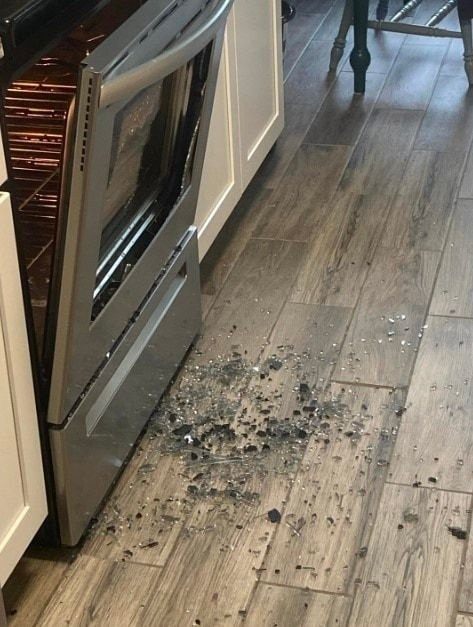Willie Mae Truesdale was startled one evening by a sudden explosion in her kitchen. To her shock, she discovered her oven door had shattered, scattering glass across the floor—even though the oven hadn’t been in use. Her experience is far from isolated; hundreds of similar reports have surfaced from homeowners facing shattered glass oven doors, raising questions about safety and manufacturing standards.

Real-Life Incidents of Shattering Glass Ovens
Truesdale’s ordeal mirrors that of many others. During the COVID-19 quarantine, Cheryl, a suburban mother, ran the self-cleaning cycle on her recently purchased oven, which hadn’t been baking evenly. As the cycle neared its end, she heard a loud bang: the inner glass of her oven door had shattered.
Michelle Wheat faced an even more alarming situation. Her oven was turned off when the glass exploded, sending shards across her kitchen floor. Thankfully, her four children weren’t hurt. These incidents span multiple brands—Truesdale owned a Frigidaire, Cheryl a Bosch—and since 2019, the Consumer Product Safety Commission (CPSC) has received over 450 reports of shattering oven doors.
Struggles with Manufacturers
One of the most frustrating aspects for homeowners dealing with shattered ovens is navigating the manufacturers’ responses.
- Truesdale’s Experience: Although her Frigidaire oven was under warranty, the technician blamed her family for the damage, and she had to pay for a replacement door out of pocket.
- Cheryl’s Resolution: Bosch replaced her oven door only after media involvement.
- Wheat’s Outcome: Her out-of-warranty oven required a $100 technician visit, followed by an additional $314 for repairs. When Frigidaire suggested an extended warranty, Wheat expressed frustration: “This should not have happened.”
Why Do Glass Oven Doors Shatter?
Mark Meshulam, a glass expert from Chicago Window Expert, explains that two primary factors contribute to these mysterious breakages:
1. The Type of Glass
Older ovens often used borosilicate glass, which is highly heat-resistant and found in lab equipment and vintage Pyrex. Modern ovens, however, use soda-lime tempered glass, which is less resistant to thermal stress. Rapid temperature changes or uneven heating can cause this type of glass to shatter.
2. Nickel Sulfide Inclusions
Nickel sulfide inclusions are tiny defects, barely a tenth of a millimeter in size, that can form during the glass manufacturing process. These flaws create internal stress, which may worsen over time. A high-heat event, such as an oven’s self-cleaning cycle, can finally trigger the glass to fail.
While reports of shattering doors may seem alarming, Meshulam reassures that self-cleaning cycles are generally safe. However, even a minor chip or flaw from years earlier could lead to a break, sometimes when the oven isn’t even in use.
How to Prevent Oven Door Shattering
Although some defects are beyond a homeowner’s control, certain precautions can help minimize the risk of glass oven doors breaking:
1. Use Gentle Cleaning Methods
Avoid abrasive tools or scouring pads when cleaning your oven door. Soft sponges or brushes can clean effectively without scratching the glass.
2. Handle the Door Carefully
Do not place heavy items on the oven door, and avoid slamming it shut. Even minor impacts can create hairline fractures that weaken the glass over time.
3. Place Items in the Oven with Care
Ensure trays and racks are properly aligned and secured before closing the oven door. Dishes or pans that touch the glass can create stress points that may lead to breakage.
4. Avoid Extreme Temperature Changes
Never hang wet towels or other cold items on a hot oven door. Sudden temperature differences between the glass and the towel can weaken the door and increase the risk of shattering.
A Rare but Serious Concern
While shattered oven doors are uncommon, the growing number of reports highlights the importance of proper handling and regular maintenance. Understanding the materials used in oven doors and the potential causes of spontaneous breakage can help homeowners take preventive steps to extend the life of their appliances.
Conclusion: Stay Safe with Preventive Care
The mystery of exploding oven doors underscores the need for attention to detail in appliance care. By adopting safe practices—gentle cleaning, careful handling, and avoiding extreme temperature shifts—you can reduce the chances of an unexpected break and keep your kitchen a safer place.
For homeowners, these incidents serve as a reminder that even small manufacturing flaws can lead to significant problems. Being proactive in maintenance and handling can make all the difference, ensuring your oven remains reliable for years to come.





